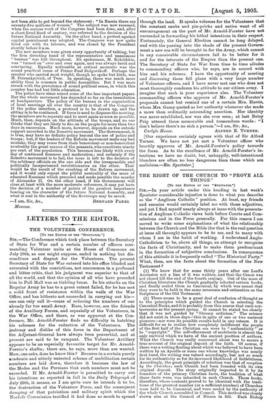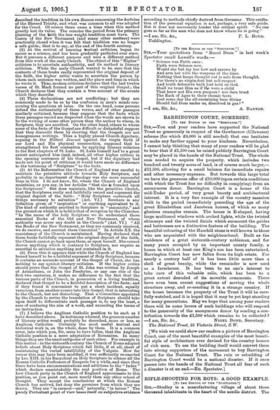[TO THE EDITOR OF THE "SPECTATOR."'
SIR,—In your article under this heading in last week's Spectator considerable injustice is done to what you describe as the "Anglican Catholic" position. At least, my friends and enemies would certainly label me with those adjectives, and yet I find myself nearly always at issue with the presenta- tion of Anglican Catholic views both before Courts and Com- missions and in the Press generally. For this reason I am moved to write some explanations of what the relationship between the Church and the Bible (for that is the real question at issue all through) appears to be to me, and to many with whom I am in the habit of working. I understand Anglo- Catholicism to be, above all things, an attempt to recognise the facts of Christianity, and to make them predominant in the formation of subjective conclusions. In consequence of this attitude it is frequently called 'The Historical Party." What, then, are the facts about the formation of the New
Testament ?
(1) We know that for some thirty years after our Lord's Ascension not a line of it was written, and that the Canon was not closed till the end of the fourth century. Out of the mass of Christian literature the Church gradually selected certain books, and finally sealed them as Canonical, by which was meant that they were to be held in the same reverence and estimation as the Scriptures of the Old Testament.
(2) There seems to be a great deal of confusion of thought as to the principles which guided the Church in selecting the Canonical Books, and it is probably from this source that such COII- troversies as the present spring. It cannot be stated too clearly that it was not guided by "literary criticism." The science did not exist in those days—this in spite of one or two eminent pioneers—nor were its possible results held in any esteem. It is difficult for us to realise how completely indifferent the people of the first half of the Christian era were to " authenticity " or to "copyright." The self-effacement of architects is almost the only survival which we have of the ancient position of authors. What the Church was really concerned about was to secure a true account of the original deposit of the faith. Of course, if there was a writing floating about which was believed to have been written by an Apostle or some one whose knowledge was nearly first hand, the writing was valued accordingly, but not so much for its authenticity as for its increased likelihood of faithfulness. Accordingly, the great principle of selection was that of reception by the Churches; each Church had been founded with its own original deposit. The story originally imparted to it by its founders of the primary Christian facts, the tradition of what those facts were, was inherited in each Church. Those books, therefore, whose contents proved to be identical with the tradi- tions of the greatest number (or a sufficient number) of Churches were held to be Canonical, and were sealed by the authority of the whole Church assembled in Council. This method was clearly shown also at the Council of Nicaea in 325. Each Bishop described the tradition in his own diocese concerning the doctrine of the Blessed Trinity, and what was common to all was adopted for the Creed. Of course there came a time when this method greatly lost its value. The remoter the period from the primary planting of the faith the less weight tradition must have. The Canon of the New Testament (and many other matters) were practically closed when it was felt that tradition was no longer a safe guide; that is to say, at the end of the fourth century.
(3) At the revival of learning textual criticism began its career as a science, and has been gradually perfected ever since. But it pursues a different purpose and uses a different method from this work of the early Church. The object of this "Higher" criticism is to ascertain authenticity, and its method is literary criticism. While the early Church wanted to be sure that the contents of these books really represented the original deposit of the faith, the higher critic wants to ascertain the person by whom each sentence was written, and the place and time in which he wrote it. Thus, modern criticism declares that the last twelve verses of St. Mark formed no part of this original Gospel ; the Church declares that they contain a true account of the events which they describe.
(4) These declarations are not conflicting ; but they are commonly made to be so by the confusion in men's minds con- cerning the questions at issue. On the one hand, some persons defend the authenticity of these verses, and of other passages eimilarly criticised, because they suppose that the facts which these passages record are disproved when the words are shown to be the writing of some other person than the author to whom, in Scripture, they are ascribed. On the other hand, others to whom some of the facts of the Gospel are difficult or distasteful suppose that they discredit them by showing that the Gospels are not homogeneous writings. Thus a highly placed Church dignitary, arguing in the Hibbert Journal against the virgin birth of our Lord and His physical resurrection, supposed that he strengthened his first contention by applying literary criticism to the first chapters of St. Luke. St. Luke himself had to a great extent anticipated him (and, indeed, all other higher critics) in the opening sentences of his Gospel, but if the dignitary had made out his point of criticism it would have made no difference to the testimony of "Scripture" to the facts.
(5) At the Reformation the Church of England was careful to maintain the primitive attitude towards Holy Scripture, and probably in no department of theology was she more successful than in this. I do not know, Sir, where the Church of England maintains, as you say, in her Articles "that she is; founded upon the Scriptures.' She does maintain, like the primitive Church, that the Scriptures really and faithfully record and represent the Original deposit of the faith : "Holy Scripture containeth all things necessary to salvation" (Art. VI.) Nowhere is any definition given of "inspiration" or anything equivalent to it. The kind of authority ascribed to Scripture is "canonicity," and the ground on which it is held is that of reception by the Churches. "In the name of the holy Scripture we do understand those canonical Books of the Old and New Testament, of whose authority was never any doubt in the Church" (Art. VI.) "All the Books of the New Testament, as they are commonly received, We do receive, and account them Canonical." In Article XX. the consistency of the Church is maintained. Having declared that these books faithfully represent the original deposit of the faith, the Church cannot go back upon them, or upon herself. She cannot decree anything which is contrary to Scripture, nor require as essential to salvation anything not contained in it.
(6) From this it appears that while the Church of England has bound herself to be a faithful exponent of Holy Scripture, because it contains an accurate account of the Gospel of Christ, she has nothing to say against literary criticism. If the higher critics ehould prove that the Gospel of St. John was written by Joseph of Arimathaea, or John the Presbyter, or any one else of the first two centuries, it makes no difference to the fact that the various parts of the Church, in possession of a living tradition, declared that Gospel to be a faithful description of the facts ; and if they found it convenient to put a short incident, equally veracious, from another source into this Gospel, that is interesting to the Church, but not disturbing. That a Committee appointed by the Church to revise the translation of Scripture should take upon itself to differentiate such passages is, to say the least, a case of confusing the aim of a work, and exceeding the terms of an instruction.
(7) I believe the Anglican Catholic position to be such as I have described above. In testimony whereof, the greatest number of literary critics would probably be described, more or less, as Anglican Catholics. Certainly the most useful textual and historical work is, on the whole, done by them. It is a common error, into which you, Sir, seem to have fallen, that the Anglican Catholic position is a mere adaptation of Romanism. In many things they are the exact antipodes of each other. For example in this matter: in the sixteenth century the Church of Rome adopted beliefs about Holy Scripture which fall little, if at all, short of maintaining the verbal infallibility of the Vulgate. How far soever this may have been modified, it was sufficiently re-enacted by Leo XIII. in his Encyclical on Holy Scripture to silence all the Roman Catholic Professors of Exegesis for a while, and since then there have been excommunications and additions to the " Index " which declare unmistakably the real position of Rome. The Low Church party in the Church of England approximate to this position, as you point out, more nearly than any other school of thought. They accept the conclusions at which the Roman Church has arrived, but deny the premises from which they are drawn. They are "in earnest—and," naturally, "in terror." The purely Protestant point of view bases itself on subjective evidence according to methods chiefly derived from Germany. This exalta- tion of the personal equation is not, perhaps, a very safe guide. But it does not necessarily hinder the critical spirit. "No one goes so far as the man who does not know where he is going."
—I am, Sir, &c., F. L. BOYD.







































 Previous page
Previous page